 Cockfighting show staged in E. China's Heze during Spring Festival
Cockfighting show staged in E. China's Heze during Spring Festival
 Chinese New Year Flower Fair opens in San Francisco
Chinese New Year Flower Fair opens in San Francisco
 Festivities in Shanghai
Festivities in Shanghai
 PLA navy conducts drill in North China Sea
PLA navy conducts drill in North China Sea
 World's high-tech hotels
World's high-tech hotels
 Li Na poses with trophy on Brighton Beach in Melbourne
Li Na poses with trophy on Brighton Beach in Melbourne
 Six Chinese divers back safely after 300-meter saturation dive
Six Chinese divers back safely after 300-meter saturation dive
 Traditional wedding ceremony of Yao people
Traditional wedding ceremony of Yao people
 Taipei Game Show attracts geeky gamers
Taipei Game Show attracts geeky gamers
Indeed, some media and political analysts are starting to believe that the lines between NHK's neutrality and the government 's right-leaning stance are becoming dangerously blurred.
A prominent Japan-based political commentator and author from Britain recently told Xinhua that NHK refutes claims that it is a state broadcaster, and while its board doesn't oversee the day-to- day operations of the broadcaster, its annual budget is subject to parliamentary approval.
It would appear that we're seeing a clear and contrived government-led shift in public broadcasting in Japan as NHK basically answers to parliament, which, to a degree, equates to its chief and its board answering directly to Abe and his administration, and this will filter down NHK's hierarchy to journalists, reporters and researchers, the expert said.
This issue was evidenced recently when a veteran radio show host quit his job at NHK after the program director instructed him not to discuss nuclear power for fear his comments "would affect voting behavior" in the upcoming Tokyo gubernatorial election, despite the pros and cons of nuclear issues being one of the major platforms the candidates are currently campaigning on.
"The media should choose various issues especially during the campaign," said Toru Nakakita, a professor of economics at Tokyo University, who was the former host of the Business Outlook segment prior to quitting.
"If they don't, voters will go to the polls with no information to base their judgments on. Isn't it the mission of the news organizations to have the guts to give more information to the public?" the popular ex-radio host said in a recent interview on the matter.
Along with Nakakita, other media professionals at NHK have felt they have been "gagged" when it comes to discussing certain topics, as Momii has openly said that he will tow the government line when it comes to broadcasting -- in direct contravention to the institution's long-standing objective and neutral broadcasting principles.
Momii has previously declared that the broadcaster might focus more air time on covering Japan's views on territorial disputes with both China and South Korea, stating that he will do the government's bidding if asked, which seriously brings the public broadcaster's pledge of neutrality, impartiality and objective news reporting into question. "It would not do for NHK to say left when the government says right," Momii said when asked on the broadcaster's official programming stance henceforth on the current territorial standoffs with China and South Korea.
Concerns are now rife that Momii and NHK are heading towards a new right-leaning programming policy, as called for by Abe who has faced criticism from nationalist factions within his government for NHK airing programs deemed to liberal.
Those working at NHK are troubled by such a shift, but reports of its implementation have been rapidly surfacing and fears are rife that other media institutions could find themselves also unable to avoid becoming the government's political mouthpieces.
British radio personality here Peter Barakan, known for his NHK programs and commercial radio sets, was quoted as saying on a recent broadcast that he, like Nakakita, had been pressured by programming directors on multiple occasions not to discuss nuclear power.
Political and media observers here are beginning to conclude that NHK might indeed be falling into line with Abe's nationalist and revisionist agenda. "A quarter of NHK board members have already revealed they have far-right leaning tendencies," said Muramatsu, referring to yet another scandal involving an NHK bigwig.
Michiko Hasegawa, another NHK board member, heaped praise on Shusuke Nomura, who was an ultra-rightwing nationalist who committed ritual suicide in the offices of the Asahi Shimbun newspaper in 1993. "Under such an openly nationalistic board of directors, hand- picked by the government to oversee one of the world's biggest broadcasters, it will become increasingly harder for NHK to maintain its credibility as a neutral, unbiased and trustworthy source of information," Muramatsu said. "Abe's reach is already too deep. The role of the media to virtuously ensure the checks and balances of its government and in this case these are quickly being eroded. If this is already happening at NHK, it doesn't bode well for privately owned and other commercial media organizations," the expert concluded.

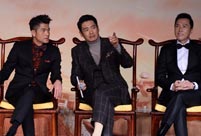 3D film 'The Monkey King' premieres in Beijing
3D film 'The Monkey King' premieres in Beijing 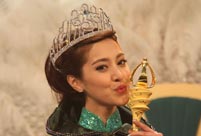 Miss Chinese Int'l Pageant 2014 held in Hong Kong
Miss Chinese Int'l Pageant 2014 held in Hong Kong 'Golden Flowers' in the Spring Festival travel rush
'Golden Flowers' in the Spring Festival travel rush Li Na beats Cibulkova to win Australian Open
Li Na beats Cibulkova to win Australian Open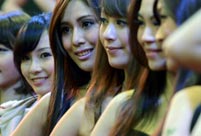 Sexy models at Taipei Game Show 2014
Sexy models at Taipei Game Show 2014 'Living in ice house' competition held in central China
'Living in ice house' competition held in central China 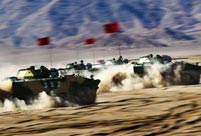 Highlights of Chinese airborne troops'exercises
Highlights of Chinese airborne troops'exercises 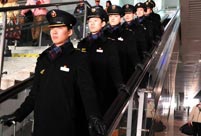 All-male high speed train crew during Spring Festival travel rush
All-male high speed train crew during Spring Festival travel rush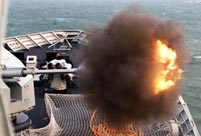 PLA navy drills in East China Sea
PLA navy drills in East China Sea President Xi visits border troops ahead of Lunar New Year
President Xi visits border troops ahead of Lunar New Year What do Chinese pack in their luggage in Spring Festival Rush?
What do Chinese pack in their luggage in Spring Festival Rush? Blind date fair in Hangzhou of Zhejiang province
Blind date fair in Hangzhou of Zhejiang province Film 'Where Are We Going, Dad' premiered in Beijing
Film 'Where Are We Going, Dad' premiered in Beijing  Australian Open champion Li Na returns to hometown Wuhan
Australian Open champion Li Na returns to hometown Wuhan Twin sisters serve during Spring Festival travel rush for the first time
Twin sisters serve during Spring Festival travel rush for the first timeDay|Week|Month